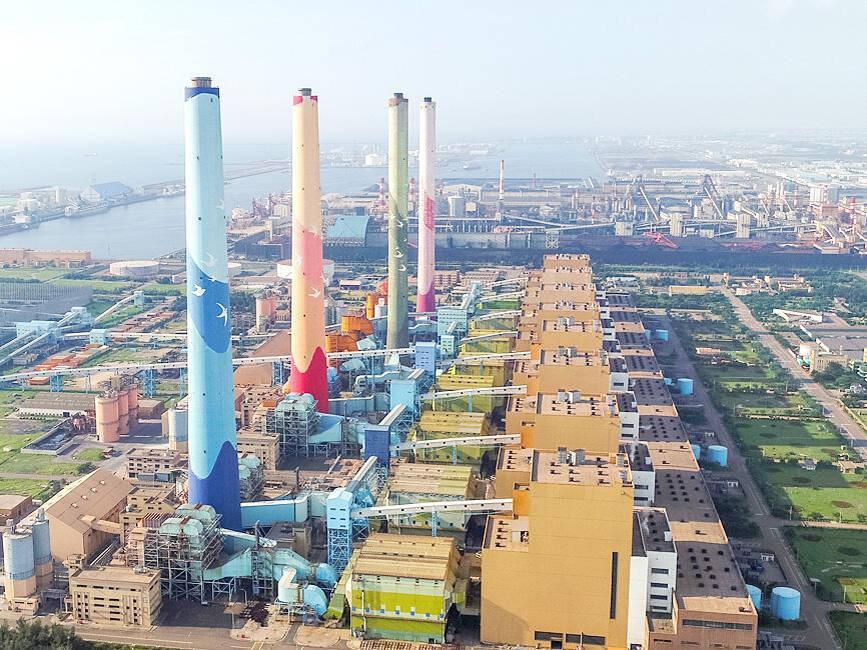Taiwan’s power supply could collapse if the Taichung Power Plant goes coal-free by 2028, as it accounts for 14 percent of the nation’s power supply, Taiwan Power Co (Taipower) chairman Tseng Wen-sheng (曾文生) said today.
The comment came after lawmakers today approved a motion proposed by opposition lawmakers to phase out coal use at the plant by 2028.
The motion, also requiring the plant to implement annual carbon reduction plans, was proposed by Chinese Nationalist Party (KMT) legislators Lo Ting-wei (羅廷瑋), Liao Wei-hsiang (廖偉翔), Huang Chien-hao (黃健豪), Yang Chiung-ying (楊瓊瓔) and Hsu Chiao-hsin (徐巧芯), as well as Taiwan People’s Party Legislator Chang Chi-kai (張啓楷).

Photo courtesy of the Taichung City Government
Tseng said that the legislature needs to consider overall future development, including the impact of the Taichung Power Plant going coal-free by 2028.
The plant’s capacity is 5.5 million kilowatts, which accounts for more than 15 percent of Taiwan’s power supply, Tseng said.
Taipower has committed to operating only nine of the plant’s 10 units, still generating up to 5 million kilowatts and accounting for 14 percent of the nation’s power supply, he said.
If this power supply is to be eliminated by 2028, the opposition parties need to consider suitable and stable alternative sources of energy and propose possibilities for discussion, Tseng said.
Giving a related example, Tseng said: “If comprehensive tax cuts were proposed, I believe all of Taiwan would support it, but where would funding come from?”
Taiwan’s current power system might collapse if it goes coal-free by 2028, he said.
Opposition parties have also proposed a referendum advocating to extend the life of nuclear power plants.
This came after the Ma-anshan Nuclear Power Plant’s No. 2 reactor was decommissioned on May 17, officially making Taiwan nuclear free.
Taipower would conduct nuclear safety assessments based on regulations set by the competent authority, Tseng said.
The safety evaluation for extending the life of nuclear power plants is very rigorous, and Taipower would publicly report its assessment results so that people can make an informed decision, he added.
If nuclear power were to make up for the power generated by the Taichung Power Plant, it would require all three of Taiwan’s nuclear power plants to resume their operations, not only Ma-anshan, he said.
Regarding Taichung Power Plant’s future plans, as natural gas units begin operating, two coal-fired units would be dismantled next year and another two in 2031, with the remaining six units to be converted into emergency backup power facilities, Tseng said.
Supposing that eight coal-fired until are operating in 2028, the plant would maintain a power supply of 4 million kilowatts, he said.

A small number of Taiwanese this year lost their citizenship rights after traveling in China and obtaining a one-time Chinese passport to cross the border into Russia, a source said today. The people signed up through Chinese travel agencies for tours of neighboring Russia with companies claiming they could obtain Russian visas and fast-track border clearance, the source said on condition of anonymity. The travelers were actually issued one-time-use Chinese passports, they said. Taiwanese are prohibited from holding a Chinese passport or household registration. If found to have a Chinese ID, they may lose their resident status under Article 9-1

Taiwanese were praised for their composure after a video filmed by Taiwanese tourists capturing the moment a magnitude 7.5 earthquake struck Japan’s Aomori Prefecture went viral on social media. The video shows a hotel room shaking violently amid Monday’s quake, with objects falling to the ground. Two Taiwanese began filming with their mobile phones, while two others held the sides of a TV to prevent it from falling. When the shaking stopped, the pair calmly took down the TV and laid it flat on a tatami mat, the video shows. The video also captured the group talking about the safety of their companions bathing

A classified Pentagon-produced, multiyear assessment — the Overmatch brief — highlighted unreported Chinese capabilities to destroy US military assets and identified US supply chain choke points, painting a disturbing picture of waning US military might, a New York Times editorial published on Monday said. US Secretary of Defense Pete Hegseth’s comments in November last year that “we lose every time” in Pentagon-conducted war games pitting the US against China further highlighted the uncertainty about the US’ capability to intervene in the event of a Chinese invasion of Taiwan. “It shows the Pentagon’s overreliance on expensive, vulnerable weapons as adversaries field cheap, technologically

Starting on Jan. 1, YouBike riders must have insurance to use the service, and a six-month trial of NT$5 coupons under certain conditions would be implemented to balance bike shortages, a joint statement from transportation departments across Taipei, New Taipei City and Taoyuan announced yesterday. The rental bike system operator said that coupons would be offered to riders to rent bikes from full stations, for riders who take out an electric-assisted bike from a full station, and for riders who return a bike to an empty station. All riders with YouBike accounts are automatically eligible for the program, and each membership account